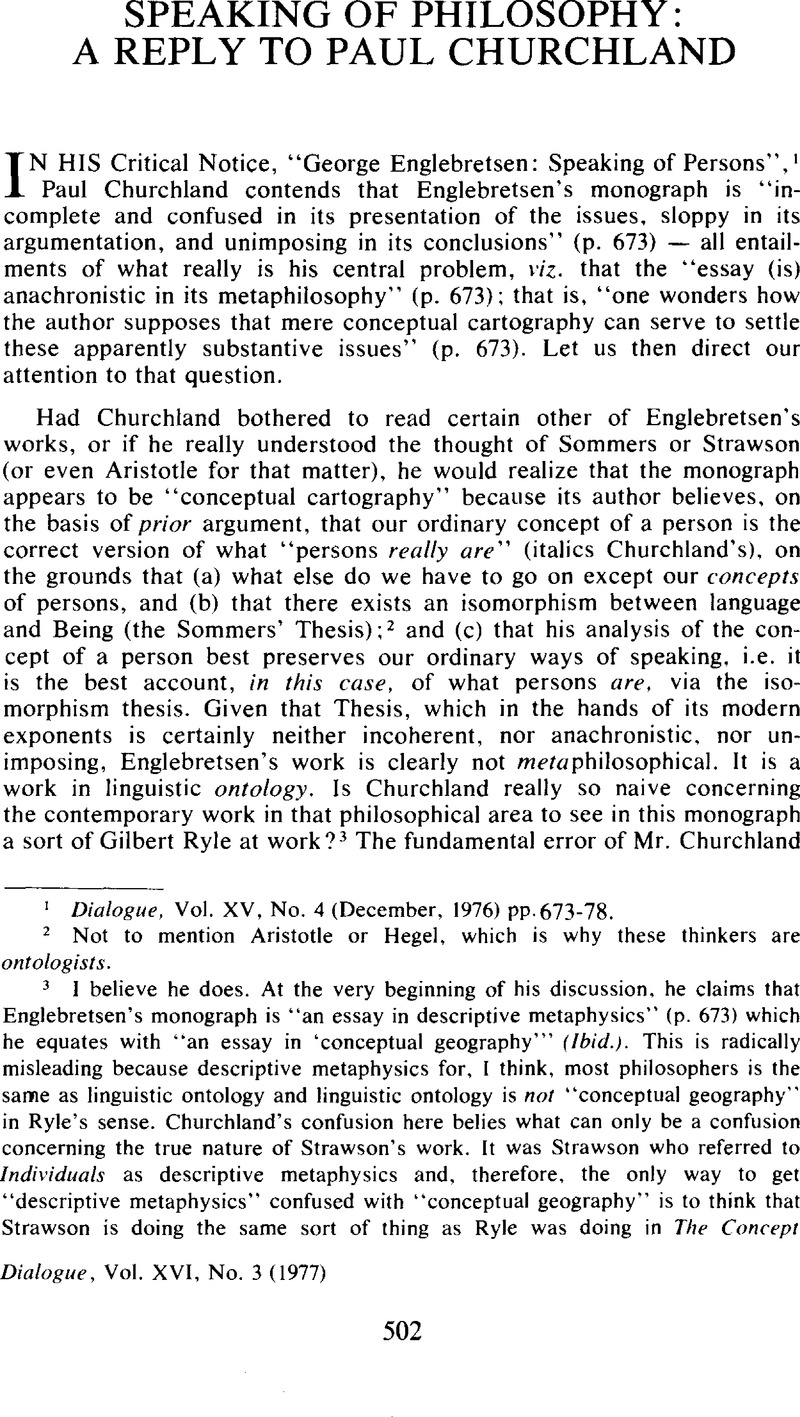No CrossRef data available.
Article contents
Speaking of Philosophy: A Reply to Paul Churchland
Published online by Cambridge University Press: 05 May 2010
Abstract

- Type
- Notes—Discussions
- Information
- Dialogue: Canadian Philosophical Review / Revue canadienne de philosophie , Volume 16 , Issue 3 , September 1977 , pp. 502 - 506
- Copyright
- Copyright © Canadian Philosophical Association 1977
References
1 Dialogue, Vol. XV, No. 4 (December, 1976) pp.673–78Google Scholar.
2 Not to mention Aristotle or Hegel, which is why these thinkers are ontologists.
3 I believe he does. At the very beginning of his discussion, he claims that Englebretsen's monograph is “an essay in descriptive metaphysics” (p. 673) which he equates with “an essay in ‘conceptual geography’” Ibid.). This is radically misleading because descriptive metaphysics for, I think, most philosophers is the same as linguistic ontology and linguistic ontology is not “conceptual geography” in Ryle's sense. Churchland's confusion here belies what can only be a confusion concerning the true nature of Strawson's work. It was Strawson who referred to Individuals as descriptive metaphysics and, therefore, the only way to get “descriptive metaphysics” confused with “conceptual geography” is to think that Strawson is doing the same sort of thing as Ryle was doing in The Concept of Mind — a view which is clearly false. It is, however, this view which is at the heart of Professor Churchland's difficulties in coming to grips with Engle-bretsen's work.
4 I am fully aware that what constitutes “incoherence” is a highly debatable point. That need not worry us here because the point is that Englebretsen has tests for incoherence which Churchland either does not accept or does not under-stand or even realize. If he had attacked Englebretsen at this level, that would have been fine; but his facile distinction between conceptual and substantive issues shows (a) that he is unaware of certain key assumptions of Englebretsen's as argued by him elsewhere; and (b) he misunderstands, therefore, the whole intent and argument of this work. Englebretsen does not argue that “it be a demand on the adequacy of a theory of persons (as opposed to a theory about our concept of a person) that it preserve the convictions of commonsense” (p. 674). What he does demand is that any theory must meet the demands of grammatical, logical, and categorical sense, because without such tests, we should all live in Alice's Wonderland. Moreover, unlike Mr. Churchland (apparently) EngJebretsen sees cleariy that any theory of a person delivers to us a concept of a person.
5 I should point out that this statement of Englebretsen's is a reference to Strawson and is not Englebretsen's own view — which Churchland does not recognize because he does not understand Englebretsen's positive thesis versus that of Strawson. Just below, I shall show that Englebretsen's Attributism is not “Strawson's view, purged of a minor lapse” (Churchland, p. 673).
6 Except in the hands of Armstrong who attempts to develop it into a Theory and defend it. (It is true that at this point, the Sommers-Englebretsen isomorphism thesis remains a thesis as well.)
7 For the meaning of this concept, see Englebretsen's footnote 13, pp. 9–10; and pp. 23–26 on “ldentifying, Reidentifying and Sorting”. From his review, it appears to me that Churchland has little idea of what Englebretsen is talking about here, in the sense that although he surely must be familiar with such terms, he does not see the use Englebretsen makes of them and how he connects them to his central procedure of analysis. Moreover, surely anyone who under-stands individuals can see that, given Strawson's Attributism, such questions as “Are dead persons still persons?” etc. become crucial for anyone who adopts Attributism; and it is Strawson himself who has worried about these questions because his general theory leads to some peculiar answers to them. Given Strawson's perspective, therefore, Englebretsen's account is clearly a major candidate for a theory which is more coherent than Strawsons's because it can deal with those questions, and it is his superior philosophy of language which enables him to do it.


